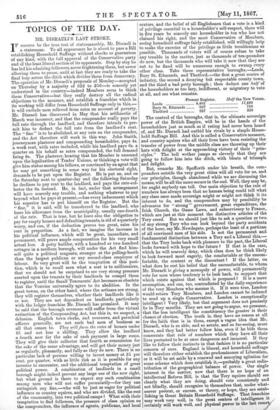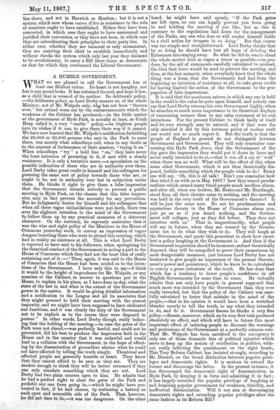TOPICS OF THE DAY.
MR. DISRAELI'S LAST STROKE.
IF success be the true test of statesmanship, Mr. Disraeli is a statesman. To all appearance he is about to pass a Bill establishing Household Suffrage without checks or guarantees of any kind, with the full approval of the Conservative party and of the least liberal section of its opponents. Step by step he has led his admiring followers, never frightening them, but never allowing them to pause, until at last they are ready to take the final leap across the ditch which divides them from democracy. The operation of Mr. Disraeli's proposals of Monday—accepted on Thursday by a majority of 322 to 256—is scarcely yet understood in the country—indeed Members seem to think them Conservative—but they really destroy all the radical objections to the measure, and establish a franchise which in its working will differ from Household Suffrage only in this,— it will exclude men relieved from rates on account of poverty. Mr. Disraeli has discovered in May that his arithmetic of March was incorrect, and that the compounder really pays the full rate through the landlord, and therefore intends to per- mit him to deduct the full rate from the landlord's rent. The " fine " is to be abolished, at any rate on the compounder, and the Act therefore will work in this way. John Smith, journeyman plasterer and compounding householder, pays 4s. a week rent, with rates included, while his landlord pays 68. a quarter on his behalf as rates compounded, the full demand being 8s. The plasterer, hearing that his Member is unsound upon the legalization of Trades' Unions, or thinking a vote will give him status among his fellows, or convinced by an agent that he may get something in some way for his electoral right, demands to be put upon the Register. He is put on, and on the Saturday next to quarter-day and the following Saturday he declines to pay rent to the landlord, and pays the rate-col- lector the 88. instead. He, in fact, under that arrangement will have scarcely any trouble, and nothing whatever to pay beyond what he pays at present,—has every inducement which his superior has to put himself on the Register. But the "fine," it is said, will be transferred to the landlord, who loses his allowance from the municipality, usually one-fourth of the rate. That is true, but he loses also the obligation to pay for empty houses and defaulting tenants, is rid of a quarterly worry, and can, if the deduction proves too great, raise his rent in proportion. As a fact, we imagine the increase in his political influence, which will be great, immediate, and permanent, will prove ample compensation for his very small actual loss. A petty builder, with a hundred or two hundred cottages in a medium borough, will under the Act find him- self quite a political magnate, stronger at the polling-booth than the largest publican or any second-class employer of labour. So very great will be the temptation of this posi- tion, which is to small men what a seat is to millionaires, that we should not be surprised to see very strong pressure exerted upon the tenants by their landlords to compel them to register, until the Small Tenements' Act becomes so obsolete that the Vestries universally agree to its abolition. In the great towns, on the other hand, where the artisans are strong, they will register themselves, whether their landlords like it or not. They are not dependent on landlords, particularly with the lodger franchise Mr. Disraeli has promised. It may be said that the borough revenues will suffer from the virtual extinction of the Compounding Act, but this is, we suspect, a delusion. English town clerks, and overseers, and parochial officers generally, are not such bad men of businesi as all that comes to. They will farm the rates of houses under 6/. and not lose a shilling. They allow the landlord a fourth now for the sake of cash payment in large sums. They will give their collector that fourth as commission for the sake of the same advantage, and will get their money just as regularly, pleasantly, and fully as they do now. There is no particular lack of persons willing to invest money at 25 per cent. per quarter, with as little risk as it is possible for any investor to encounter, and the additional temptation of great political power. A combination of landlords in a small borough might indeed prevent any large use of the new right, but what ground is there to expect any such combination among men who will not suffer pecuniarily—for they can extinguish any fine,—who will be just as eager for political influence as country squires, and who are divided, like the rest of the community, into two political camps ? What with their temptation to rind followers, the pressure of class opinion on the compounders, the influence of agents, publicans, and local orators, and the belief of all Englishmen that a vote is a kind_ in five years be scarcely one householder in ten who has not of privilege essential to a householder's self-respect, there will claimed his right, and the most Conservative of Members, seeing household suffrage fairly established, will willingly help- to make the exercise of the privilege as little troublesome as possible. Thousands of voters will of course refuse to take any trouble in the matter, just as thousands of ten-pounders- do now, but the thousands who will take it now that they are not to be fined will be numerous enough to swamp every other class. Take three representative boroughs,—Leeds, Bury St. Edmunds, and Thetford,—the first a great centre of industry, the second a decaying bul respectable county town, and the third a bad petty borough ; then deduct one half of the householders as too lazy, indifferent, or migratory to vote- at all, and see what remains.
-Present Register. Half the New Voters.,
Leeds 8,486 17,489 Bury St. Edmunds 697 748 Thetford 237 826
The control of the boroughs, that is, the ultimate sovereign power of the British Empire, will be in the hands of the householders just as much as if rating had never been hear& of, and Mr. Disraeli had outbid his rivals by a simple House- hold Suffrage Bill. And this is called a Conservative measure, and 'country squires who all their lives have been resisting the- transfer of power from the middle class are throwing up their hats with delight at the approaching victory of their "prin- ciples." The bell wether jumps so cleverly that they are going to follow him into the ditch, with bleats of triumph, and delight.
But, remarks Mr. Spofforth under his breath, the com- pounders outside the very great cities will all vote for us, and our principles, though abandoned while we are discussing the means, will be all the more secure in the end. Well, they may be,. for aught anybody can tell. Our main objection to the rule of numbers has always been that no human being could tell what any class once made sovereign might or might not think it its interest to do, and the compounders may by possibility be advocates for "strong "' government, great expenditure, the Irish Church, the Game Laws, and subserviency to France, which are just at this moment the distinctive articles of the Tory creed. But we should just like to ask a question or two. of any strong Tory who can look beyond the party accidents of the hour, say Mr. Newdegate, perhaps the least of ,a partizan. of all convinced men of his side. Is not the permanent and: fundamental distinction between a Tory and a Liberal this,— that the Tory looks back with pleasure to the past, the Liberal looks forward with hope to the future ? If that is the case, which he will scarcely deny, which class does he think likely to look forward most eagerly, the comfortable or the uncom- fortable, the content or the discontent ? If the latter, on what does he rest his belief that the uncomfortable, to whom. Mr. Disraeli is giving a monopoly of power, will permanently vote for men whose tendendy is to look back, to support that which exists against that which is proposed ? It is a mere assumption, and one, too, contradicted by the daily experience of the very Members who assume it. If it were true, London, would return Tory Members, and London cannot be induced to send up a single Conservative. London is exceptionally intelligent ? Very likely, but that argument does not precisely lie in Tory mouths. They are not going to argue, we presume, that the less intelligent the constituency the greater is their chance of election. The truth is, they have no reason at all for the, faith that is in them, except a vague idea that Mr. Disraeli, who is so able, and so astute, and so far-seeing, must know, and they had better follow him, even if he bids them. consecrate that rule of numbers which they have all their lives protested to be at once dangerous and immoral. If they like to follow, their instincts in that fashion it is no particular concern of ours. England is liberal, and household suffrage will therefore either establish the predominance of Liberalism, or it will be set aside by a renewed and annoying agitation for some scheme which does establish it,—probably a great redis- tribution of the geographical balance of power. Our single interest in the matter, now that there is no hope of an intellectual Reform Bill, is that the Tory squires should see clearly what they are doing, should vote consciously and not blindly, should recognize to themselves that, under what- soever pretext, or excuse, or theory, or hope, they are estab- lishing in Great Britain Household Suffrage. That franchise may work very well, in the great centres of intelligence it certainly will work well, and physical power in the last reso,. lies there, and not in Harwich or Honiton ; but it is not a 'system which men whose raison d'Are is resistance to the rule of numbers ought to have established. Either they have been -converted, in which case they ought to have announced and justified their conversion; or they have not been, in which case -they are subordinating their principles to their party ties. In either case, whether they are immoral or only inconsistent, -they are assisting their chief to establish immediately and without checks the system which only last year they declared -to be revolutionary, to carry a Bill three times as democratic .as that for which they overturned the Liberal Government.































 Previous page
Previous page